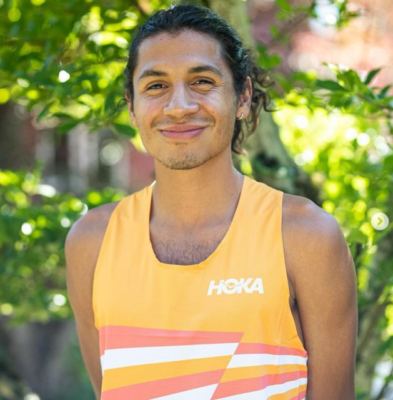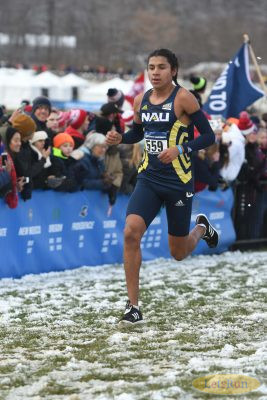DACA Status Could Destroy Luis Grijalva’s 2020 Olympic Dream
By Jonathan Gault
July 24, 2021
Update: Luis Grijalva got his waiver and will be going to the Olympics and Tokyo.
View this post on Instagram
Luis Grijalva is in a race against the clock. But this time, there is no track.
Back on June 11 in Eugene, Ore., Grijalva ran a personal best of 13:13.14 to finish second in the NCAA 5,000-meter final for Northern Arizona University. Grijalva, who was a member of three NCAA cross country champion teams at NAU, also snuck under the Olympic Games automatic qualifying standard of 13:13.50, setting up a hectic month for the 22-year-old.
In early July, Grijalva was officially named to the Guatemalan Olympic team. There was a problem, however: if he left to compete in Tokyo, he would not be allowed back to the United States, the country in which he has resided for the past 21 years. Back in 2000, Grijalva’s parents arrived in New York City as undocumented immigrants from Guatemala. Grijalva and his two brothers came with them. Grijalva was one year old at the time.
“Guatemala at the time was pretty rough for my parents just because they weren’t making a lot of income and they had to feed me and my two older brothers,” Grijalva says. “It was a better opportunity for us to come here to the United States for my dad to get a job that could support his family.”
 Courtesy Luis Miguel Grijalva Instagram
Courtesy Luis Miguel Grijalva Instagram
The family moved to California when Grijalva was three. In 2012, the Obama administration introduced DACA (Deferred Action for Childhood Arrivals), a policy that allowed people who arrived in the United States as undocumented immigrants as children to remain in the country, though it does not offer legal status or a pathway to citizenship. Grijalva applied and was accepted for DACA and is now one of over 600,000 individuals protected from deportation.
DACA Recipients Normally Can Not Leave the Country
There are a number of restrictions on DACA recipients, including international travel: DACA recipients cannot leave and re-enter the country.
There are a few exceptions to that rule, however. DACA recipients are allowed to travel for humanitarian, educational, or employment purposes.
Grijalva’s lawyer, Jessica Smith Bobadilla, believes Grijalva, who signed a professional contract with HOKA ONE ONE earlier this month, would fit two of the criteria in traveling to Tokyo for the Olympics.
“Because he is a professional athlete, I think it’s work,” Smith Bobadilla said. “And because it’s the Olympics it’s also a humanitarian event.”
The complicating factor is time. Normally an application for a travel waiver, known as advance parole, takes roughly 90 days to be processed. But Grijalva did not achieve the Olympic standard until June 11, just 53 days before the first round of the 5,000 meters in Tokyo. And he wasn’t officially named to the Guatemalan team until early July.
Initially, Grijalva wasn’t too optimistic about the chance to compete at the Olympics. But things changed once he decided to turn professional.
“What was really cool was the contract he signed [with HOKA] had a budget line in there for some legal fees to tackle his DACA status, citizenship, and situations like this,” says Mike Smith, who coached Grijalva at NAU and will continue to coach him as a pro. “So all of a sudden he was in a place, financially, where he could explore these things.”
Grijalva hired Smith Bobadilla and on July 5, she sent a request for advance parole to United States Citizenship and Immigration Services (USCIS). Since then, she and Grijalva’s agent Ray Flynn have engaged a full court press to push Grijalva’s application through. Flynn has reached out to the office of Tom O’Halleran, the congressman for the district in Arizona in which Flagstaff resides, and the office of Arizona senator Mark Kelly.
“I’ve asked for their support,” Flynn says. “It’s a popular [thing to] support. Most people would think, hey, this is a good thing. Why not help a kid go to the Olympic Games? Who doesn’t love the Olympic Games?”
Smith Bobadilla, who is based in California, will travel to Phoenix on Sunday and plans on pleading Grijalva’s case at the local USCIS office on Monday. Should that fail, she will reach out to her congressional contacts. Her hope is to get Grijalva’s case in front of the right person who can expedite the decision.
“The original piece of legislation that dealt with people like Luis — that didn’t make it through Congress — was called was the DREAM Act,” Smith Bobadilla said. “This is an example of the dreams that some of these kids have that are on hold or where there’s all these obstacles to even achieve their dreams…I feel like I need to get out there and do everything I can to push because I’ll never forgive myself if he doesn’t get to the Olympics and I feel there’s something more we could have done or tried.”
At this point, Flynn says, there is no room for error. Grijalva is slated to fly to Tokyo on July 28, but Flynn said it would not be an issue for him to fly on July 29 or 30 if it took an extra few days to secure the advance parole. Anything beyond that would be tough as the first round of the 5,000 meters is on August 3 and it takes a full day to travel to Japan.
“It’s a huge problem if we can’t get a good kid to the Olympics for a few days when he has permission to be in the country,” Smith Bobadilla says. “I think that’s really a sign that the system is broken.”
As Grijalva’s Olympic fate hangs in the balance, he is already trying to cushion the blow of potentially bad news.
“I’ve been going into the entire process trying to think of it like, all right, pretend I’m not going to the Olympic Games,” Grijalva says. “That’s kind of been my mindset, that way if I hear, ‘Oh no, you can’t go to the Games,’ I’ll be prepared.”
If he does get to compete in Tokyo, however, it would represent the fulfillment of a dream that has been with Grijalva since his earliest days of running in high school.
“It’s every runner’s dream to compete at the Olympic Games,” Grijalva says. “It would mean so much to me.”
History in Tokyo
Grijalva is already easily the fastest distance runner in the history of Guatemala. His personal best of 3:35.32 for 1500 meters (equivalent to 3:52.6 for the mile), which he ran at the Sunset Tour SoCal meet last weekend, is nine seconds faster than any other Guatemalan, while his 13:13.14 5,000m pb is over 30 seconds faster than #2 on the all-time Guatemalan list. Should he compete in Tokyo, he would be the first Guatemalan athlete in an Olympic track event since 2000.
Grijalva eventually would like to get his green card and US citizenship, but until DACA is reformed to offer a pathway to citizenship, that is not an option for him. And in recent years, DACA has been subject to the whims of the current occupant of the White House.
“There’s been so much ping-pong, back and forth with the DACA program due to litigation and the interpretation of whether the program is valid by the different administrations since Obama, through Trump, and now the Biden administration, that it’s kind of dizzying,” Smith Bobadilla says.
Waiting for his citizenship in order to compete for the US would have been an option for Grijalva, albeit not a very appealing one. Just look at Kenya’s Edward Cheserek, who racked up 17 NCAA titles at the University of Oregon. Cheserek had multiple opportunities to compete at global championships for Kenya but passed them up in the hopes of attaining US citizenship (competing for Kenya would have made it more difficult for him to later compete for the US). Now, four years after graduating from Oregon, Cheserek still doesn’t have US citizenship and still hasn’t made a global championship team (he finally ran the Kenyan trials this year but failed to qualify).
Grijalva, for his part, is very excited for the opportunity to compete for Guatemala — if not at the Olympics, than certainly at next year’s World Championships in Oregon.
“I could wait [to try to compete for the US], but honestly I think it would be amazing to represent Guatemala at the Olympics just because I was born there and my parents were born there and have whole generations of family that were there,” Grijalva says.
He also acknowledges that running for Guatemala does have its perks — it is easier to make a World or Olympic team as he would only have to hit the qualifying time and not endure a grueling national championships as in the US. But the idea of representing a country that rarely gets attention in major competitions is appealing to Grijalva.
“How awesome would it be to wear the Guatemala uniform at the biggest stage in the world?” Grijalva says. “Because honestly, USA has a lot of [Olympians]…And if I did become an American citizen, it’s not that I’m afraid of oh, I couldn’t make a team. I think I could be really competitive if I was at the Trials this past year.”
Should Grijalva make it to Tokyo, his coach believes he can qualify for the final.
“I think Luis has got several Olympic Games in front of him,” Smith says. “In his first Olympics, I think making an Olympic final would be a fantastic goal. His PR in the 1500 a month ago was 3:39 and he’s run two of them [since then] and he’s run 3:36 and he just went 3:35 the other night. His leg speed is in a fantastic place right now and I think those qualities for tactical rounds in the 5,000 would be really handy. So I think he’s absolutely capable of making the Olympic final and from there, just seeing how high he can place there would be a great start to international competition.”
Smith, like Grijalva, is not trying to get his hopes up too much. He does not want to deal with the devastation should Grijalva’s paperwork not come through in time. But he believes Grijalva represents the best of what the DACA program has to offer.
“I always say Luis is such an example, to me, of how this sport can change lives,” Smith says. “Luis is a guy who found a great high school coach at a great high school program and made amazing opportunities for himself with his college degree and opportunities post-collegiately through the sport. And he’s just had gratitude every step of the way. He’s been a leader on our team, he’s been just a fantastic teammate. He’s someone who has just been fantastic on our campus all around with our professors and faculty here. He’s someone who I really feel makes a great statement about what the NAU program is about.
“…Luis is one of the best guys on Earth and he’s got an amazing energy to him that brings other people up. And most of all he’s been so humble in his success and really been someone that’s wanted to bring other people with him. He’s just such an easy guy to root for.”




